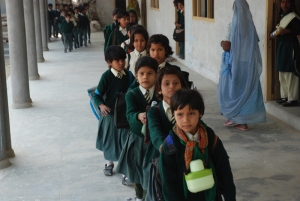Arti writes from India…
“Everything gets done on the paper, nobody really comes to see how we are doing,” I was told in response to my question about
whether the local education official had sent anyone to do the survey of adult illiterates (15-35 years) in Jalalpur basti. The truth behind the above statement was completely apparent and alarming because, according to the 2007-08 survey done by the district officials of Bhadohi, there are only 17 illiterates in this age group in Jalalpur. I believe I met about 15 of those in my one trip to Jalapur. The odds are that there are many more to be found in this basti of a few thousand people!
Jalalpur is a small, densely packed slum in the city of Bhadohi. Bhadohi district is one of the main centers of the carpet-weaving belt of India. It lies in the populous and utterly backward state of Uttar Pradesh, racked by government corruption and apathy.
Walking through Jalapur, I asked, “Why is all this garbage lying here?” I was informed that the Nagar Palika (the city municipal body) uses this particular area, packed with people and children, as the dumping ground for trash from everywhere in the city.
Because I was so unprepared for what I would see in Jalalpur, I took my one-year old son with me. The filth, the utter squalor of the slum and of many of the residents there took its toll on him. Children, dirty and in torn shreds, looking badly in need of better nutrition were all around. I saw a young girl, not even capable yet of taking care of herself, with a three-month old in her arms. Both were so malnourished that the three-month old could have been mistaken for a one-month old. My own son came down with a fever that very night!
I started inquirin g of their mothers about whether the children go to school at all. These were some of the responses I received:
g of their mothers about whether the children go to school at all. These were some of the responses I received:
“She was not attending school regularly, and dropped out after one year.”
“My son failed one grade, and then left school.”
“He did not come home and do his homework, his grades were very bad – he left school.”
There is no doubt a general understanding, even in urban slums like Jalalpur, that schooling is the way to get out of the cycle of poverty; but there is also, no doubt, a real lack of understanding of the effort required in schooling on the part of parents and children. Partly because these parents are illiterate and they themselves don’t comprehend the schooling process.
One thing that became very clearly to me as I stood with two generations of women who had not been educated was how inseparably linked a woman’s wellbeing is with that of her child. This fact was staring me in the face the way it hadn’t thorugh all the research articles I’d read. If women are better educated, then they are better informed. This means that their children are better cared for. If they are not educated, the health of their children is adversely affected. It sets them on the path they are to take in life, whether it is one of progress, or one of stagnation. It determines whether they are caught up in the cycle of poverty, or whether they are able to break free.
I came away from Jalalpur feeling their palpable sense of need, though no one made any demands of me or required that I, as a development professional or as someone better off than them, should provide them a service of any sort.
Every medium and large city in India has slums like Jalalpur, inhabited by the low-caste—those who perceive of themselves as powerless. There are thousands of Jalalpurs in India and millions of people living in them – men and women who are bringing up children to grow more cities such as their own. Where and how will this cycle end, and how can we best intervene in an effective fashion –is the challenge we face.

